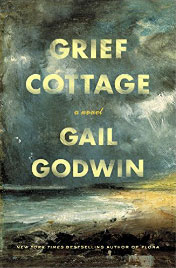Essay
The Watcher at the Gate
by Gail Godwin
I first realized I was not the only writer who had a restraining critic who lived inside me and sapped the juice from green inspirations when I was leafing through Freud's "Interpretation of Dreams" a few years ago. Ironically, it was my "inner critic" who had sent me to Freud. I was writing a novel, and my heroine was in the middle of a dream, and then I lost faith in my own invention and rushed to "an authority" to check whether she could have such a dream. In the chapter on dream interpretation, I cam upon the following passage that has helped me free myself, in some measure, from my critic and has led to many pleasant and interesting exchanges with other writers.
Freud quotes Schiller, who is writing a letter to a friend. The friend complains of his lack of creative power. Schiller replies with an allegory. He says it is not good if the intellect examines too closely the ideas pouring in at the gates. "In isolation, an idea may be quite insignificant, and venturesome in the extreme, but it may acquire importance from an idea which follows it. . . . In the case of a creative mind, it seems to me, the intellect has withdrawn its watchers from the gates, and the ideas rush in pell-mell, and only then does it review and inspect the multitude. You are ashamed or afraid of the momentary and passing madness which is found in all real creators, the longer or shorter duration of which distinguishes the thinking artist from the dreamer. . . . You reject too soon and discriminate too severely."
So that's what I had: a Watcher at the Gates. I decided to get to know him better. I discussed him with other writers, who told me some of the quirks and habits of their Watchers, each of whom was as individual as his host, and all of whom seemed passionately dedicated to one goal: rejecting too soon and discriminating too severely.
It is amazing the lengths a Watcher will go to keep you from pursuing the flow of your imagination. Watchers are notorious pencil sharpeners, ribbon changers, plant waterers, home repairers and abhorrers of messy rooms or messy pages. They are compulsive looker-uppers. They are superstitious scaredy-cats. They cultivate self-important eccentricities they think are suitable for "writers." And they'd rather die (and kill your inspiration with them) than risk making a fool of themselves.
My Watcher has a wasteful penchant for 20 pound bond paper above and below the carbon of the first draft. "What's the good of writing out a whole page," he whispers begrudgingly, "if you just have to write it over again later? Get it perfect the first time!" My Watcher adores stopping in the middle of a morning's work to drive down to the library to check on the name of a flower or a World War II battle or a line of metaphysical poetry. "You can't possibly go on till you've got this right!" he admonishes. I go and get the car keys.
Other Watchers have informed their writers that:
"Whenever you get a really good sentence you should stop in the middle of it and go on tomorrow. Otherwise you might run dry.."
"Don't try and continue with your book till your dental appointment is over. When you're worried about your teeth, you can't think about art."
Another Watcher makes his owner pin his finished pages to a clothesline and read them through binoculars "to see how they look from a distance." Countless other Watchers demand "bribes" for taking the day off: lethal doses of caffeine, alcoholic doses of Scotch or vodka or wine.
There are various ways to outsmart, pacify, or coexist with your Watcher. Here are some I have tried, or my writer friends have tried, with success:
Look for situations when he's likely to be off-guard. Write too fast for him in an unexpected place, at an unexpected time. (Virginia Woolf captured the "diamonds in the dust heap" by writing at a "rapid haphazard gallop" in her diary.) Write when very tired. Write in purple ink on the back of a Master Charge statement. Write whatever comes into your mind while the kettle is boiling and make the steam whistle your deadline. (Deadlines are a great way to outdistance the Watcher.)
Disguise what your are writing. If your Watcher refuses to let you get on with your story or novel, write a "letter" instead, telling your "correspondent" what you are going to write in your story or chapter. Dash off a "review" of your own unfinished opus. It will stand up like a bully to your Watcher the next time he throws obstacles in your path. If you write yourself a good one.
Get to know your Watcher. He's yours. Do a drawing of him (or her). Pin it to the wall of your study and turn it gently to the wall when necessary. Let your Watcher feel needed. Watchers are excellent critics after inspiration has been captured; they are dependable, sharp-eyed readers of things already set down. Keep your Watcher in shape and he'll have less time to keep you from shaping. If he's really ruining your whole working day, sit down, as Jung did with his personal demons, and write him a letter. "Dear Watcher," I wrote, "What is it you're so afraid I'll do?" Then I held his pen for him, and he replied instantly with a candor that has kept me from truly despising him.
"Fail," he wrote back.

